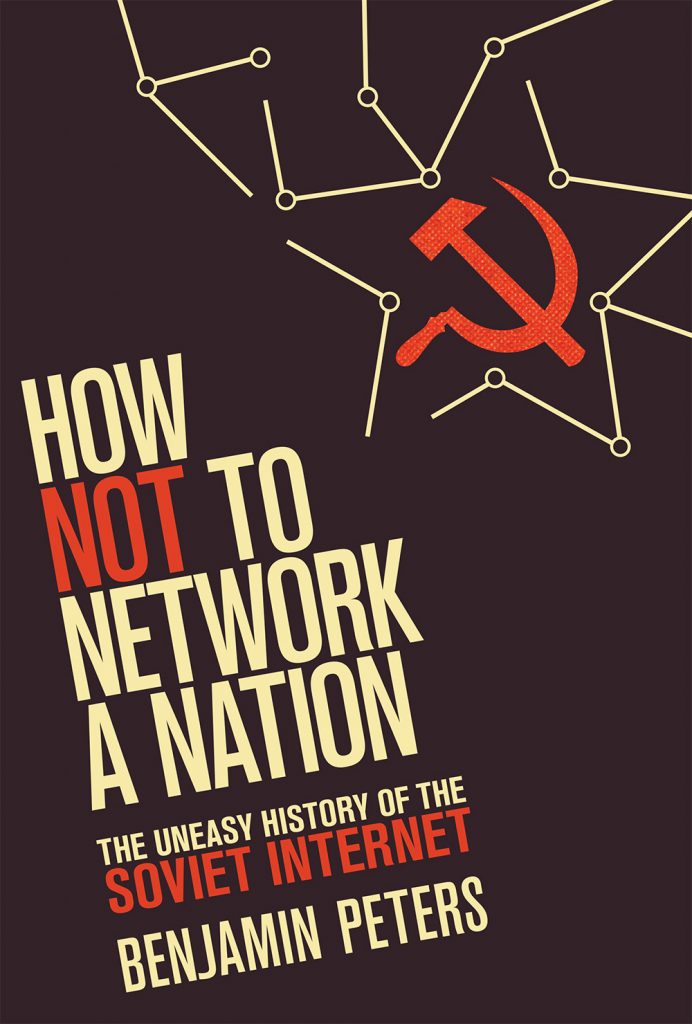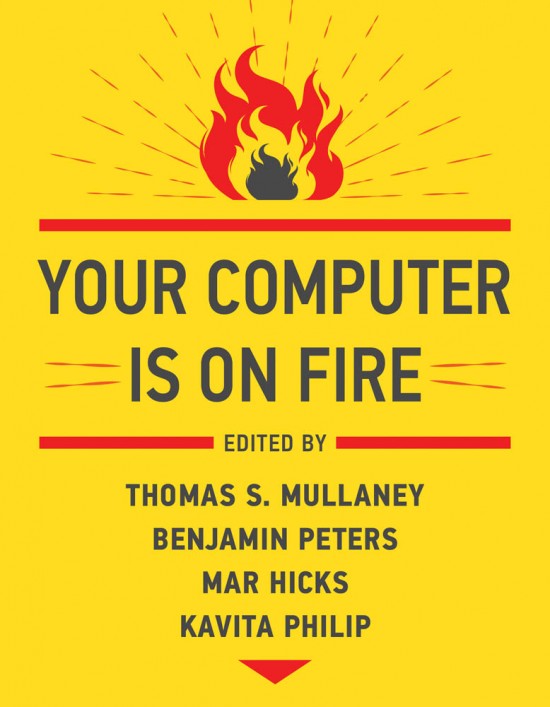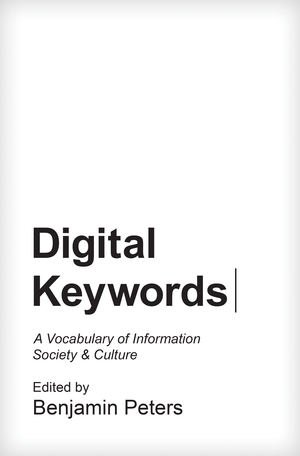How Not to Network a Nation: The Uneasy History of the Soviet Internet

eBook | $27.00 Short | ISBN: 9780262334174 | 312 pp. | 23 b&w illus.| April 2016
Purchase at MIT Press | About MIT Press eBooks | MIT Press Author Page
From Information Policy
Purchase at Barnes & Noble
Awarded the 2017 Vucinich Book Prize for “the most important contribution to the [Slavic studies] field in any discipline of the humanities or social sciences”
Awarded the 2018 Computer History Museum Prize for “a pathbreaking contribution to the understanding of the history of computing and networking.”
Received a 2017 PROSE Award Notable Mention in the History of Science, Technology, and Medicine
Excerpted in 20th-anniversary issue of First Monday.
Featured in Aeon
Overview
Between 1959 and 1989, Soviet scientists and officials made numerous attempts to network their nation—to construct a nationwide computer network. None of these attempts succeeded, and the enterprise had been abandoned by the time the Soviet Union fell apart. Meanwhile, ARPANET, the American precursor to the Internet, went online in 1969. Why did the Soviet network, with top-level scientists and patriotic incentives, fail while the American network succeeded? In How Not to Network a Nation, Benjamin Peters reverses the usual cold war dualities and argues that the American ARPANET took shape thanks to well-managed state subsidies and collaborative research environments and the Soviet network projects stumbled because of unregulated competition among self-interested institutions, bureaucrats, and others. The capitalists behaved like socialists while the socialists behaved like capitalists.
After examining the midcentury rise of cybernetics, the science of self-governing systems, and the emergence in the Soviet Union of economic cybernetics, Peters complicates this uneasy role reversal while chronicling the various Soviet attempts to build a “unified information network.” Drawing on previously unknown archival and historical materials, he focuses on the final, and most ambitious of these projects, the All-State Automated System of Management (OGAS), and its principal promoter, Viktor M. Glushkov. Peters describes the rise and fall of OGAS—its theoretical and practical reach, its vision of a national economy managed by network, the bureaucratic obstacles it encountered, and the institutional stalemate that killed it. Finally, he considers the implications of the Soviet experience for today’s networked world.
Endorsements & Reviews
“Benjamin Peters’s book is not only a scintillating explanation of why the Soviet Internet failed to materialize but also a first-rate sociopolitical investigative report and a delicious tale of how Soviet efforts to manage a command economy left them without either command or an economy.”
“Peters offers a compelling account of the Soviet Union’s failed attempts to construct their own Internet during the Cold War period. How Not to Network a Nation fills an important gap in the Internet’s history, highlighting the ways in which generativity and openness have been essential to networked innovation.”
“As early as 1962, cybernetics experts in the Soviet Union proposed a complex, large-scale computer network. It fit with a socialist vision but not with bureaucratic politics and a faltering command economy. It was never realized, but the story sheds light both on Soviet history and on the social conditions that shape computing and communications networks. It is a previously unknown story, now elegantly told by Benjamin Peters together with a thoughtful analysis that makes the early history of computing seem full of possibilities not obvious.”
“[Peters’] quarry is the great white whale of this specialized historiography: the Soviet Internet.”
“Peters has written the definitive narrative on the topic. For those looking to understand the Communist mindset in an information technology perspective, How Not to Network a Nation: The Uneasy History of the Soviet Internet is an interesting read.”
“An immersive read that covers the ground in impressive detail.”
“A great set of stories…a fantastic storyteller… really pleasurable.”
“The story of how Peters tracked down this and other facts is almost a Cold War thriller itself…. a cautionary tale for those tasked with building the networks of tomorrow.”
“A new and intriguing book… Anyone interested in the history of the internet, comparative systems, or the history of the Soviet Union should read this book.”
Your Computer is on Fire

| 416 pp. | 7 x 9 in | 24 b&w illus.| March 2021
Purchase at MIT Press | About MIT Press eBooks | MIT Press Author Page
Awarded Strategy & Business Best Business Books 2021
Selected Public Books 2021 Picks
Overview
Techno-utopianism is dead: Now is the time to pay attention to the inequality, marginalization, and biases woven into our technological systems.
This book sounds an alarm: after decades of being lulled into complacency by narratives of technological utopianism and neutrality, people are waking up to the large-scale consequences of Silicon Valley–led technophilia. This book trains a spotlight on the inequality, marginalization, and biases in our technological systems, showing how they are not just minor bugs to be patched, but part and parcel of ideas that assume technology can fix—and control—society.
The essays in Your Computer Is on Fire interrogate how our human and computational infrastructures overlap, showing why technologies that centralize power tend to weaken democracy. These practices are often kept out of sight until it is too late to question the costs of how they shape society. From energy-hungry server farms to racist and sexist algorithms, the digital is always IRL, with everything that happens algorithmically or online influencing our offline lives as well. Each essay proposes paths for action to understand and solve technological problems that are often ignored or misunderstood.
Contributors
Janet Abbate, Ben Allen, Paul N. Edwards, Nathan Ensmenger, Mar Hicks, Halcyon M. Lawrence, Thomas S. Mullaney, Safiya Umoja Noble, Benjamin Peters, Kavita Philip, Sarah T. Roberts, Sreela Sarkar, Corinna Schlombs, Andrea Stanton, Mitali Thakor, Noah Wardrip-Fruin
Book Editors
Thomas Mullaney, Benjamin Peters, Mar Hicks, Kavita Philip
Endorsements & Reviews
“The collection of impactful tech issues interrogated over the span of decades in this book makes it recommended reading for anyone interested in the impact of tech policy in businesses and governments, as well as people deploying AI or interested in the way people shape technology.”
“Technology is so embedded in our lives that we can sometimes forget it is there at all. Your Computer is on Fire is a vital reminder not only of its presence, but that we urgently need to extinguish the problems associated with it.”
“The book tech critics and organizers have been waiting for.”
“An all-star collection of readable and complex stories, all aimed at ensuring the naive view of neutral technology gets buried and, please, left in the past.”
“The authors fearlessly dismantle the technology industry’s most sacred assumptions, forcing a rethinking of everything we’ve come to accept as true about our digital lives and the multibillion-dollar digital transformations going on inside our companies. Titles such as ‘Gender Is a Corporate Tool,’ ‘A Network Is Not a Network,’ and ‘Coding Is Not Empowerment’ pull no punches.”
“A compelling case for the value of the humanities – and of history, in particular – in offering us a critical perspective to challenge the fantasies of genius innovators and streamlined progress.”
Digital Keywords: A Vocabulary of Information Society and Culture

Excerpts
Paperback | 2016 | $24.95 | £18.95 | ISBN: 9780691167343
Hardcover | 2016 | $70.00 | £51.95 | ISBN: 9780691167336
352 pp. | 6 x 9 | 3 halftones. 1 table.
![]() Add to Shopping Cart
Add to Shopping Cart
eBook | ISBN: 9781400880553 |
Our eBook editions are available from these online vendors
Reviews | Table of Contents
Introduction[PDF] ![]()
555 Questions to Make Digital Keywords Harder: A Teaching Resource
Finalist for the 2017 Susanne K. Langer Award for Outstanding Scholarship in the Ecology of Symbolic Form, Media Ecology Association
Google full text of this book:
In the age of search, keywords increasingly organize research, teaching, and even thought itself. Inspired by Raymond Williams’s 1976 classic Keywords, the timely collection Digital Keywords gathers pointed, provocative short essays on more than two dozen keywords by leading and rising digital media scholars from the areas of anthropology, digital humanities, history, political science, philosophy, religious studies, rhetoric, science and technology studies, and sociology. Digital Keywords examines and critiques the rich lexicon animating the emerging field of digital studies.
This collection broadens our understanding of how we talk about the modern world, particularly of the vocabulary at work in information technologies. Contributors scrutinize each keyword independently: for example, the recent pairing of digitalandanalog is separated, while classic terms such as community, culture, event, memory, and democracy are treated in light of their historical and intellectual importance. Metaphors of the cloud in cloud computing and the mirror in data mirroring combine with recent and radical uses of terms such as information, sharing, gaming, algorithm, and internet to reveal previously hidden insights into contemporary life. Bookended by a critical introduction and a list of over two hundred other digital keywords, these essays provide concise, compelling arguments about our current mediated condition.
Digital Keywords delves into what language does in today’s information revolution and why it matters.
Endorsements & Reviews
“Digital Keywords interrogates some of the words at the center of our socio-technical world, revealing the way in which the digital has reconfigured culture. This inspiring book is essential for all who are trying to understand our contemporary mediated society. It’s a pure delight for anyone who hasn’t stopped to think about the power of these words.”
“Digital Keywords is fascinating, erudite, informative, and delightful. This is a cabinet of present-day wonders to which I’m sure I’ll return many times.”
“The distinguished contributors of Digital Keywords analyze the ways language has changed as a result of the digital revolution. The result is an engaging and readable tour through important concepts in scholarly debate and public discourse.”
“Now, 40 years after Williams began the journey into the politics and culture behind language, his work has been continued – and readapted for the 21st century – in a book that seeks to carry on where he left off, by digging out the roots of digital language and discovering how it has shaped the newfound society we live in today…. with the release of this book, the digital language journey is just getting started. ‘Digital Keywords’ serves as an in-depth interrogation of the meaning and development of digitised language, and strives to reveal the way in which the digital has reshaped society and rewritten culture. You can learn a lot about society from language, and those wishing to gain a deeper understanding of the modern, digital world we all inhabit would be well advised to begin by taking a look at this book. Just as ‘Keywords’ made its way firmly onto reference shelves in the 1970s, so too will ‘Digital Keywords’ today.”